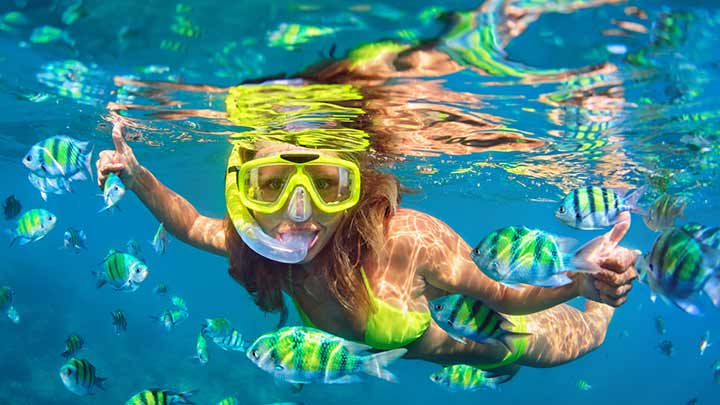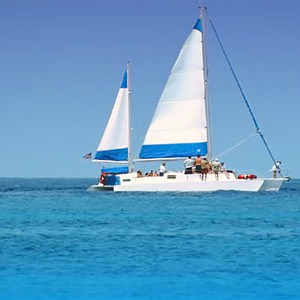Snorkeling in the Virgin Islands is an amazing experience. There is plenty to see underwater, it is a relatively easy activity, and it requires little gear. There is however a small learning curve to snorkeling, so take a few minutes to read through the following snorkeling tips. They will help ensure that the first- time you try snorkeling in the Virgin Islands, you will love it.
Some of the most common first time snorkeling experiences that go poorly involve: leaky masks, foggy masks, discomfort using the snorkel, water flooding the snorkel, lack of familiarity clearing the snorkel, fatigue from swimming, injury by accidentally or intentionally touching marine life and coral, and just not seeing a whole lot. These poor experiences can be avoided by following a few tips.
1. Get the right fitting snorkeling gear
There are a variety of mask shapes and sizes, there are also different types of snorkels, and there are different types of fins. Making sure your mask, snorkel and fins fit and work well for you is key. Many a snorkeling trip fails because of a leaky mask. When buying or renting a mask, test it on your face. Here is a quick test for fitting masks. Hold the mask against your face with your hands without putting the strap behind your head. Holding the mask in place, inhale slightly through your nose. You should feel a vacuum form, let go of the mask slightly, keeping your hands near to catch the mask if it falls. If the mask stays in place, you have a good seal. If it falls, try another mask. A good fitting mask can still fog up, and a foggy mask is a pain while snorkeling because you cannot see anything which leads to frustration. To help prevent fogging, make sure your mask is clean, and use an anti-fog. Next you need a snorkel, and there are different types including dry snorkels. Dry snorkels have valves to help keep water out of them. First time snorkelers might find dry snorkels easier to use. Finally, make sure your fins fit snug but do not hurt your feet.
2. Practice with your Snorkeling Gear
You need to get used to wearing your mask, breathing through a snorkel, and using your fins. At the shoreline of a beach or in a shallow area of a pool put on your gear, adjust your gear as needed, make sure it all feels good. Make sure none of your hair is within the skirt of the mask that sits on your face, water will drip along your hair into the mask and slowly flood it. In shallow, calm water take the opportunity to practice. Put your masked face in the water, check for a tight seal. Let some water into your snorkel and practice purging it. You do that by blowing hard to force the water out. Swim and kick your fins to get used to them. Be comfortable with the gear so that you can relax when you go snorkeling. You want to be able to swim at a leisurely pace, breathe easily and enjoy the view.
3. Be honest with yourself regarding your swimming abilities
Snorkeling requires swimming, and swimming is tiring. The further out you swim, the more energy you use, and you will have to swim back to your starting point. You should remain horizontal while snorkeling to protect the marine life below you. If you are unsure of your swimming endurance and your ability to remain floating and swimming horizontally, use a floatation device like a vest or a noodle.
4. Pick a good location for your first snorkel
When you go snorkeling for the first time in the US Virgin Islands, you want to pick something appropriate for a beginner. Pick a snorkeling spot that is calm and is known to have interesting things to see. If you are going for a beach snorkel, find out where exactly the good snorkeling is located. If the reef is only on the right side of the beach, and you snorkel on the left side, you are not going to see anything of interest. Snorkel trips by boat can take you out to more remote snorkeling spots. These offshore sites will typically be in deeper water than a beach snorkel. Often on snorkel-boat trips a crew member gives snorkel tips and sometimes joins in the water as a guide.
5. Check the snorkeling conditions
Make sure you have good snorkeling conditions for your first snorkel. The waters around the Virgin Islands are known to be crystal clear and calm, however weather systems can change these conditions quickly. The water can get rough or it can be rainy and overcast. Occasionally the best beach accessible snorkels are not good because the water is cloudy from recent high seas, swells, or flooding. Cloudy water means low visibility. You therefore must keep the weather in mind when going snorkeling.
6. Respect the underwater environment and do your part to keep it healthy
Snorkeling is about appreciating the underwater world and protecting it. Do not touch coral, fish, turtles and other marine life. Observe them from a distance. Do not stand on coral reef or hold onto rocks and ledges encrusted with marine life. The slightest touch with hands, fins or equipment can do irreparably damage. Do not feed the fish. Dog biscuits, potato chips, bread, fries are not part of the natural fish diet. Also feeding fish disrupts the natural balance of reef ecosystems. Take nothing dead or alive from the reef and sea. Be content to look and leave everything where you found it. Wear reef safe sun protection. Sunscreens with oxybenzone, octocrylene, and octinoxate are banned in the Virgin Islands, as they are known to damage coral and marine ecosystems. Respect the marine life you are observing.
Remember, gear that fits, practice and get comfy with using your gear, know your swimming abilities, pick a good snorkel spot, check the recent weather conditions, respect the marine environment, and have a great time snorkeling in the Virgin Islands.





